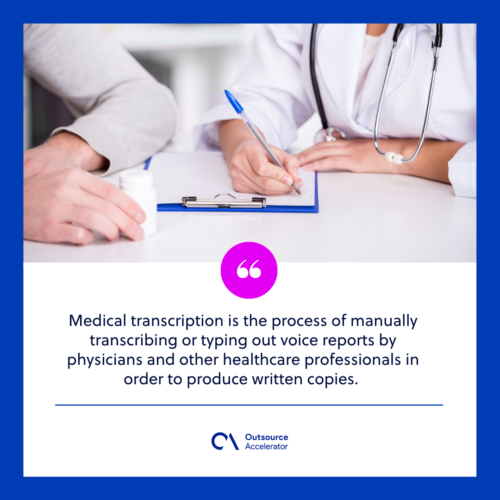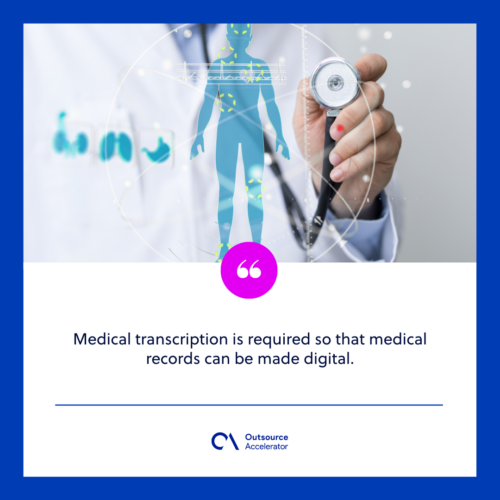Medical transcription
Definition
What is medical transcription?
Medical transcription is the process of manually transcribing or typing out voice reports by physicians and other healthcare professionals in order to produce written copies.
Medical transcriptionists type audio clips to text, often in digital format, after professionals record audio notes. They may also examine and modify medical papers generated by speech recognition technologies.

How does medical transcription work?
Healthcare providers use portable digital recorders to help them perform fast procedures. They dictate clinical summaries and notes, avoiding the more time-consuming task of writing them down.
In turn, they work with a medical transcriptionist to do the encoding.
The medical transcriptionist turns audio files into written documents that may be readily preserved, shared with other physicians, and examined promptly.
Further, they edit and format reports exactly as required, then securely return them so that physicians can review them and recommend changes if necessary.
Once all this information is collected, it is then uploaded into digital storage.
Is medical transcription hard?
Medical transcription, like most occupations, can be challenging. However, with thorough training, transcriptionists can produce high-quality transcripts with ease and accuracy.
Some reports are long and complicated, while others are brief. Some physicians and healthcare professionals talk clearly, while others do not. That said, knowledge of medical terminology and the healthcare industry makes it easier to fulfill the job requirements.
Why is medical transcription necessary?
Medical transcription is required so that medical records can be made digital. This makes it easier to store and transfer between medical firms, as is the case when consulting with different professionals.
In addition, it aids doctors and nurses in patient care, using medical transcripts as a reference to understand a person’s condition better. Some other healthcare providers also rely on transcriptions for accurate medical billing.

How to be a medical transcriptionist
Medical transcriptionists (MTs) must first complete training at a recognized educational institution and be well-versed in medical terminology and pharmaceutical aspects.
This required training explains why these professionals are sometimes termed as a “registered healthcare documentation specialist” or a “certified healthcare documentation specialist.”
Along with these skills, other basic but also crucial skills required for medical transcription are typing and grammar skills. These are important in order to produce transcripts efficiently and accurately.
What are the skills a medical transcriptionist should have?
Here, we discuss the necessary skills to become a medical transcriptionist:
Medical knowledge
A medical transcriptionist should have advanced knowledge of medical terminology and vocabulary. This way, they can transcribe recordings fast and accurately.
Transcriptionists may work with medical dictionaries; however, most companies prefer individuals with a wide vocabulary in different medical specialties. This skill also aids in healthcare documentation integrity.
Typing skills
Medical transcriptionists are usually paid based on the “line count” rather than by the hour. So, the faster they type, the more money they make.
A successful medical transcriptionist can usually type quicker than the average speed. Typing accuracy is also essential for medical transcription services because typing errors are not acceptable in medical reports.
Writing skills
A medical transcriptionist must be an expert in spelling, grammar, and format. In a medical setting, common errors can have serious consequences. Therefore, clarity and excellent writing abilities are essential in this type of work.
Computer skills
To perform their duties, medical transcriptionists must be able to operate specific computer software programs, including word processors such as Microsoft Word and audio editing software.
Medical transcriptionists can use these technologies to perform their work efficiently and interact directly with their supervisors and employers.
Some healthcare providers have also begun implementing speech recognition software to aid their medical transcriptionists further.
Attention to detail
Medical transcription is a systematic occupation. Professionals must be able to listen attentively to physicians’ data and accurately transcribe what they hear.
They must thoroughly edit their paperwork to remove any errors and double-check the physicians’ and their language for correctness. Meticulous and attentive professionals are more likely to succeed in medical transcriptionist jobs.







 Independent
Independent




